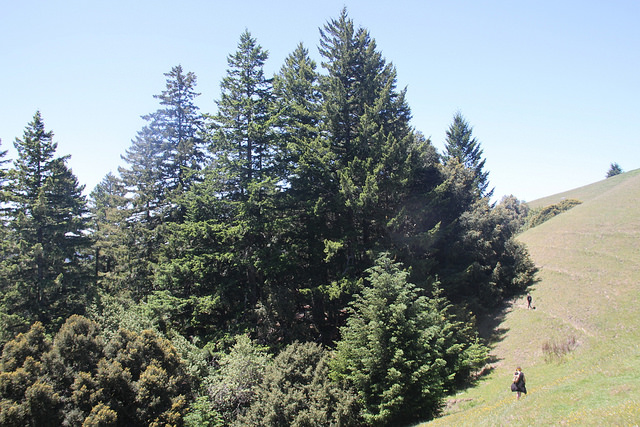 Image courtesy Mattole Forest Defense.
Image courtesy Mattole Forest Defense.
Tensions between timber protesters and the Humboldt Redwood Company appear to be escalating.
After bringing harvest operations to a halt earlier this week, a group called Mattole Forest Defense (among other names) today issued a press release accusing timber fallers of cutting down trees in close proximity to protesters and thus placing them in “imminent danger.” A member of the group contacted the Outpost via Facebook with a message saying in part, “One person was hit with flying debris while observing logging from the [Humboldt Redwoods] State Park.”
No one was injured, according to Kerul Dyer, who is acting as an informal spokesperson for the group.
The press release accused company officials of threatening to continue cutting trees, regardless of how close protesters stand.
Reached by phone this afternoon, Humboldt Redwoods Company President Mike Jani acknowledged that there was “an incident” yesterday but said the protesters put themselves in harm’s way.
“They had not made the fallers aware that they were in the area,” he said. “This small group apparently moved themselves around in the woods in order to take videos, and they did not inform our fallers [of their location].”
Jani said his employees would never intentionally drop trees near onlookers unless the onlookers were in a safe location, accompanied by “our people” and equipped with hard hats and safety goggles. “That has always been our standard,” he said.
Both sides of this dispute agree that the definition of “old-growth” Douglas fir is the crux of the matter. While Humboldt Redwood Company puts the baseline around 200 years old, Dyer said it’s more complicated than that.
“I would say that the definition of ‘old growth’ is constantly changing, and the timber industry seems to change it to meet their needs,” she said. “The point is that a native forest — one that has not been cut before — is where they’re working. That cannot be considered sustainable forestry.”
The group is also concerned about new access roads damaging the sensitive Mattole watershed, Dyer said, adding that older trees should be salvaged because of their ability to sequester carbon. “We have to rethink the way that we manage forests in the era of climate change,” she argued. Dyer and other activists feel that Humboldt Redwood Company is converting healthy forests into “plantation-style” monocrops.
Jani disagrees, saying his company has put reserves in place to protect the unique old growth stands in the Mattole watershed. And he’s hoping to defuse the tension of this situation.
“We have nothing to hide; we’re happy to show people what we’re doing,” he said. “But we do have to insist on safety for people.”
Dyer, on the other hand, said protesters are ready for a long fight. They’d like to see the public comment process reopened for the company’s various timber harvest plans in the region. Failing that, they’re not going anywhere.
“As long as the Humboldt Redwood Company continues to push plans in this watershed,” Dyer said, “resistance like today will continue.”
CLICK TO MANAGE